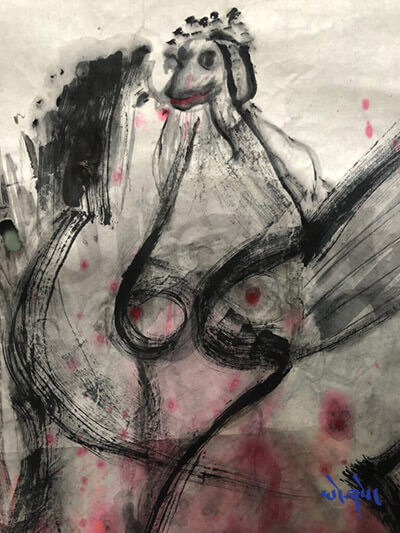ISSN 2768-4261 (Online)

A Journal of Tibetan Literature, Arts and Humanities
Looking for Answers
Jangbu
(Translated from the Tibetan by Lama Jabb)
What’s happened?
So quiet, us today!
Don’t we want to tell? Or, don’t we know how to tell?
As if watching a movie with the sound turned off
This flashing of red lightning but without the sound of the thunder
Like a choked throat
Why is it that the darkness is darker than before, in the aftermath of the light?
This dashing of the body of waves against the rock but without the sound of the crash
Like covered ears
Where did those beauties on becoming crumbling flesh and bones come from?
This losing of precious lives of siblings and relatives without the sound of cries to hear
Like feelings are also already dead
We who always have only a similar thought and similar feeling
Especially in the aftermath of a great calamity
What’s the matter? How did it go?
Don’t we dare to tell? Or, don’t we have anything to tell?
So quiet, the world today!
So quiet, like being dead
Like this pandemic, possessing swiftness
Like a thorn deep within the flesh that can’t be torn out
Are we looking for a question?
If the road outside is blocked and the gate shut
Is the space inside really getting bigger and bigger?
If you find something resembling an answer by chance sometime
Please do also tell me what it is, your gracious body, your gracious speech!
You and me, and him, come along!
We will cut and snip each answer one after another
And make a crown of reminders adorned with yerkha bells
And put it on the head of humanity
If we could really do so then even the slightest motion made by humans
Might set the yerkha bells ringing, jingle, jingle, jingle, jingle warning of danger
དྲིས་ལན་འཚོལ་བ།
ལྗང་བུ།
ག་རེ་བྱུང་སོང་ ?
དེ་འདྲའི་ཁ་ཁུ་སིམ་པོ། དེ་རིང་གི་ང་ཚོ་།
བཤད་མ་འདོད་པ་རེད་དམ། བཤད་མ་ཤེས་པ་རེད
སྒྲ་ལམ་བཀག་ཟིན་པའི་གློག་བརྙན་ཞིག་ལ་ལྟ་བཞིན་པ་དང་འདྲ་བར
གློག་དམར་འཁྱུག་འཁྱུག་བྱེད་པ་ཙམ་ལས་འབྲུག་སྒྲ་མེད་པ་འདི
མིད་པ་བཀག་བཞག་པ་ནང་བཞིན
འོད་ཟེར་གྱིས་རྗེས་ལ་མུན་པ་དེ་སྔར་ལས་གནག་པའི་རྒྱུ་མཚན་ག་རེ་ཡིན་ནམ
རྦ་རླབས་ཀྱི་ལུས་པོ་བྲག་ངོས་ལ་བརྡབ་པ་ཙམ་ལས་ཆོམ་སྒྲ་མེད་པ་འདི
ཨམ་ཅོག་བཀབ་བཞག་པ་ནང་བཞིན
ཤ་ཐོར་རུས་ཐོར་ཆགས་ཚུལ་གྱི་མཛེས་སྡུག་དེ་དག་ག་ནས་བྱུང་པ་ཡིན་ནམ
སྤུན་མཆེད་དང་། གཉེན་ཉེ་ཚོའི་གཅེས་སྲོག་ཤོར་ཡང་ངུ་སྐད་མི་གོ་བ་འདི
ཚོར་བའང་ཤི་ཚར་བ་ནང་བཞིན
ག་དུས་ཡིན་ནའང་། ཆག་སྒོ་ཆེན་པོ་ཞིག་སླེབས་པའི་རྗེས་ལ་ལྷག་པར་དུ
བསམ་བློ་གཅིག་འདྲ་ཞིག་དང་། ཚོར་བ་གཅིག་འདྲ་ཙམ་མ་གཏོགས་མེད་པའི་ང་ཚོ
ག་རེ་བྱས་སོང? ག་འདྲ་བྱུང་སོང?
བཤད་མ་ཕོད་པ་རེད་དམ། བཤད་རྒྱུ་གང་ཡང་མེད་པ་རེད ?
དེ་འདྲའི་ཁ་ཁུ་སིམ་པོ། དེ་རིང་གི་འཇིག་རྟེན
དེ་འདྲའི་ཁ་ཁུ་སིམ་པོ། ཤི་བ་ནང་བཞིན་གྱི།
ནད་ཡམས་འདི་ནང་བཞིན་གྱི། ལྡེམ་མྱུར་ཅན་གྱི།
ཤ་གསེང་ནས་བཀོག་མ་ཐུབ་པའི་ཚེར་མ་ནང་བཞིན་གྱི
དྲི་བ་ཞིག་འཚོལ་གྱིན་ཡོད་དམ
ཕྱི་ལོགས་ཀྱི་ལམ་ཀ་དེ་བཀག་ཅིང་། སྒོ་ཆེན་དེ་བརྒྱབ་པ་ཡིན་ན
ནང་ལོགས་ཀྱི་རྒྱ་ཁྱོན་དེ་དངོས་གནས་ཆེ་ནས་ཆེ་རུ་འགྲོ་བཞིན་ཡོད་རེད་པས
ནམ་ཞིག་ཁྱེད་རང་ལ་དྲིས་ལན་འདྲ་པོ་ཞིག་སྟེས་དབང་གིས་རྙེད་པ་ཡིན་ན
ང་ལའང་དེ་ག་རེ་ཡིན་པ་གཅིག་གསུངས་གནང་རོགས། སྐུ་མཁྱེན། གསུང་མཁྱེན།
ཁྱོད་དང་ང་། ད་དུང་ཁོང་། མཉམ་དུ་ཤོག་དང་། ང་ཚོས
དྲིས་ལན་དེ་ཚོ་རེ་རེ་བཞིན་དྲས་གཏུབ་བྱས་ཤིང་།
གཡེར་ཁའི་རྒྱན་ཆ་སྤྲས་ཏེ། གསལ་འདེབས་ཀྱི་ཅོད་པན་ཞིག་བཟོས་ནས། འགྲོ་བ་མིའི་དབུ་ཐོད་ལ་བསྐོན་ཆོག
དངོས་གནས་དེ་འདྲ་བྱེད་ཐུབ་པ་བྱུང་ན། མི་རྣམས་འགུལ་བསྐྱོད་བྱས་པ་ཙམ་གྱིས་ཀྱང
སིང་སིང་སིང་སིང་ཞེས་གཡེར་སྒྲའི་ཉེན་བརྡ་སྒྲོག་ཡོང་གིན་མེད་འགྲོ
Translator’s note: Yerkha bells གཡེར་ཁ། གཡེར་དྲིལ། are usually small in size and made of metal and spherical shaped like yerma གཡེར་མ seed pods (Sichuan pepper). Tibetans use them, among other things, as adornment, musical instrument, wind charm, and warning bells. Yerkha might be rendered into English as a ‘sleigh bell’ or ‘jingle bell’ but I have left the Tibetan word untranslated so as not to erase its cultural reference and imagistic association. In a poem of many silences (imposed or otherwise) it is these yerkha bells – their yerma-like shape hinting at the ultrastructure of the COVID-19 virus – that makes a much-needed sound and alerts humanity.
Dorje Tsering Chenaktsang (A.K.A. Jangbu) is an acclaimed poet, writer, artist, and filmmaker from Amdo. His documentary films include Tantric Yogi, Kokonor, Ani Lachem, and Yartsa Rinpoche. He is the co-author of the screenplay of the acclaimed film Prince of the Himalayas. Dorje Tsering Chenaktsang’s poetry, published under his penname Jangbu, have also been translated and published in different languages, including an English translation The Nine-Eyed Agate, and in French, Le Hachoir Invisibile. He currently lives in France.
Lama Jabb (Ph.D. 2013) is a scholar, translator, and poet. He teaches Tibetan language and literature at the University of Oxford. He has published many academic articles and two books, Modern Tibetan Literature: The Inescapable Nation and Studies in the History of Eastern Tibet. His research explores, among other topics, the intertextual nature of Tibetan literature and the interplay between the Tibetan literary text and oral traditions.
© 2021 Yeshe | A Journal of Tibetan Literature, Arts and Humanities


